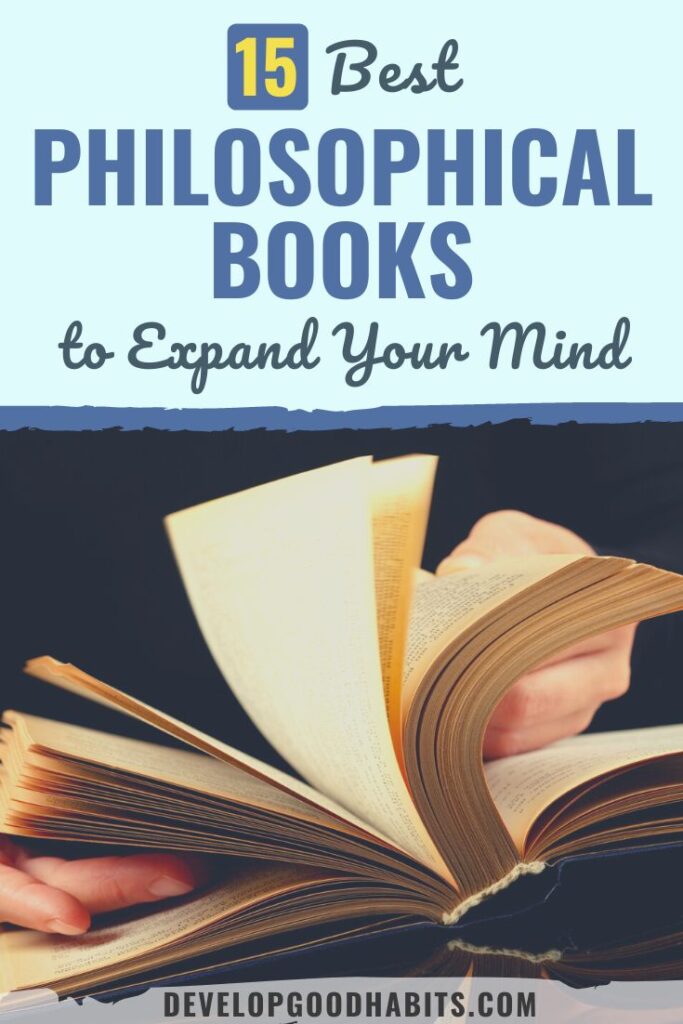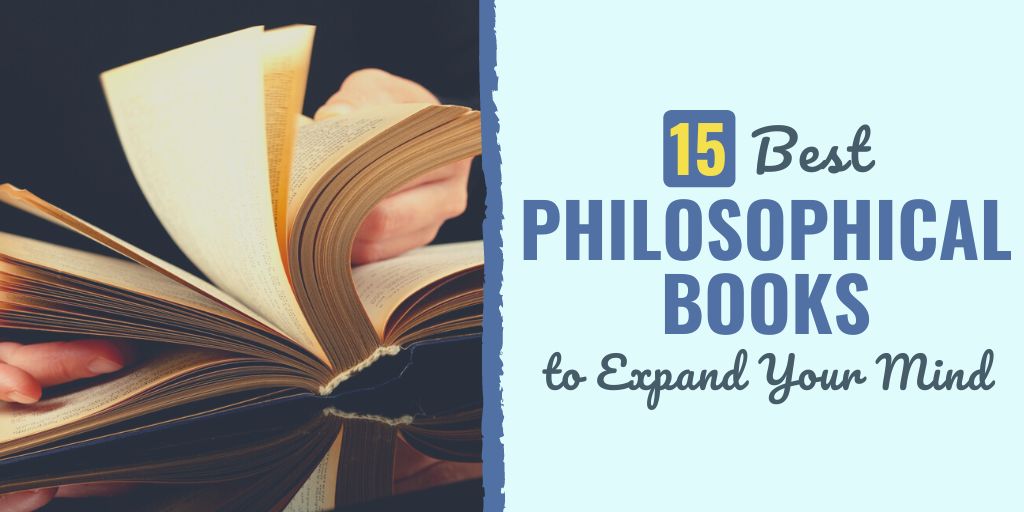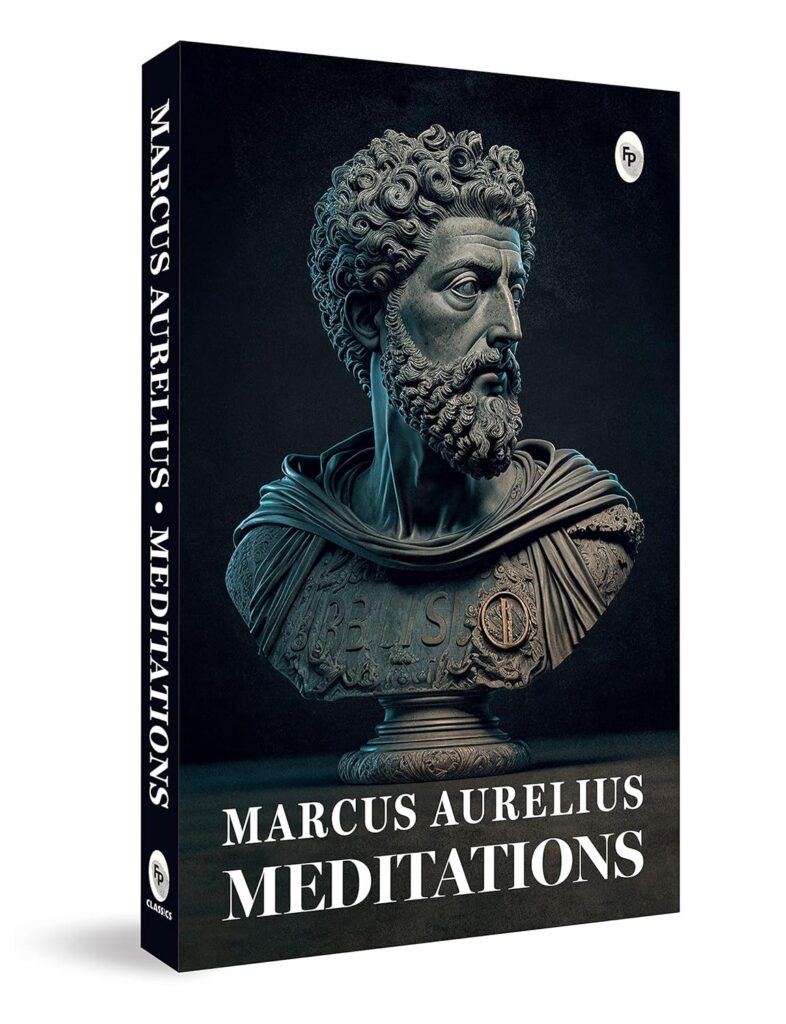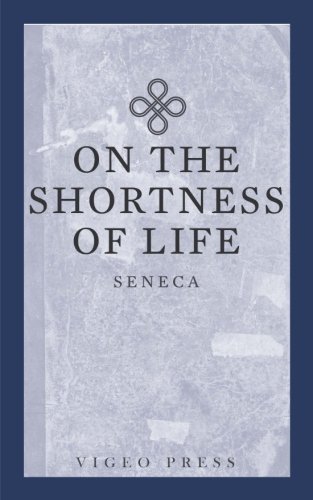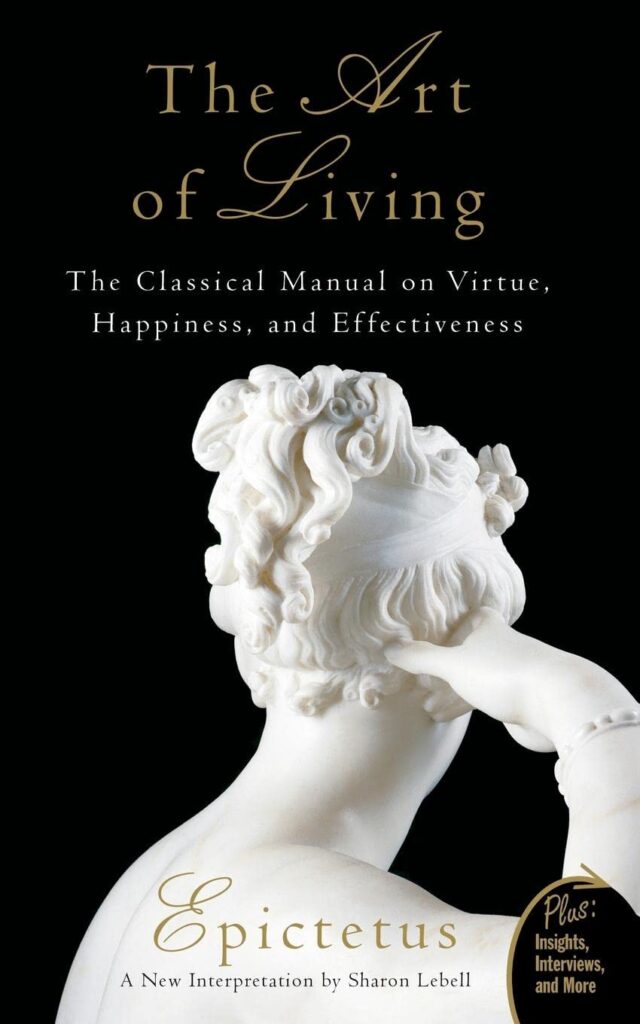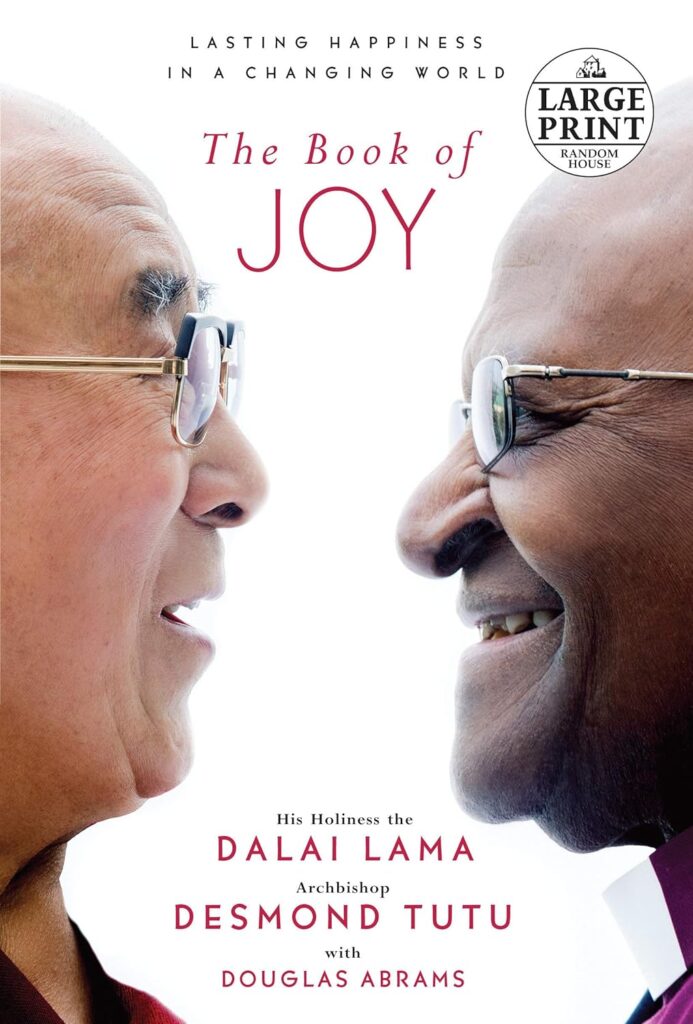Do you have any questions about the universe? What about human existence? The fundamental basis of your general values?
I know that when I even try to consider how to make sense of it all, I get so overwhelmed that I often give up. However, according to Socrates, “The unexamined life is not worth living”.
But how can you really reflect on these abstract concepts surrounding our reality?
One way is to read books on philosophy that offer other people’s ideas and theories on this topic.
People tend to find philosophical books to be difficult to understand because philosophers typically write for other philosophers rather than ordinary people.
This can discourage the everyday person from reading this genre because the precise language often reduces readability. However, the solid arguments in these books are made in the manner that they are in order for the authors’ ideas to not be misinterpreted.
The truth is, reading philosophical books can grant you with a level of self-awareness that’s essential to have in order to live a healthy life. While it can be scary to engage in introspection, it's important to do if you want to live authentically.
You can use philosophy to help you gain a better understanding of your mind and take better control of your future. Reading other people's ideas can help you become open to philosophical questions and start to analyze your own existence outside of external influences.
Reading philosophical books can also help you recognize the evolution of human thought. With that said, let’s look at 15 of the best philosophical books that you can read to help expand your mind.
15 Best Philosophical Books to Read in 2024
1. Plato: Five Dialogues by Plato
Check Ebook Price on Amazon
Check Print Book Price
Takeaways:
- Plato's Five Dialogues offers profound insights into the nature of knowledge, morality, and the human condition, providing timeless philosophical reflections on these fundamental aspects of existence.
- The dialogues present thought-provoking discussions on justice, virtue, and the nature of reality, inviting readers to contemplate and question their understanding of these fundamental concepts.
- Through the characters of Socrates and his interlocutors, Plato engages in profound explorations of ethics, politics, and the pursuit of wisdom, offering enduring philosophical wisdom that continues to resonate with contemporary readers.
- The dialogues prompt readers to critically examine their beliefs and assumptions, encouraging deep introspection and intellectual inquiry into the nature of truth and the good life.
- Plato's Five Dialogues serves as a foundational work in Western philosophy, inspiring ongoing discourse and debate on the enduring questions of human existence and the nature of reality.
Many argue that all Western philosophy stems from Plato. If you’re new to reading philosophy, you can gain a basic appreciation by reading the works of Socrates’ most famous student, Plato.
Plato: Five Dialogues: Euthyphro, Apology, Crito, Meno, Phaedo presents readers with five dialogues that are great examples of Plato’s philosophical wisdom.
Euthyphro offers the argument that it’s impossible for morality to derive from gods–regardless of whether or not gods exist.
Apology summarizes Socrates’ defense statements from his trial where he was being accused of immorality and the corruption of the Athenian youth, where he was condemned to death.
In Crito, Socrates takes a look at the concept of justice and proposes one of the first versions of social contract theory.
Meno focuses on the idea of virtue as well as the idea that knowledge can be defined as established true belief.
Finally, Phaedo recounts the last moments of Socrates’ life, where he explores the soul and the afterlife.
This collection of dialogues illustrates great ideas, writing, and philosophy. This translation can feel a bit literal at times, but it’s still understandable. Readers appreciate the footnotes that explain Socrates' expressions and historical references made in this book.
After reading this book, you will have an understanding of early philosophical thoughts.
2. Man’s Search for Meaning by Viktor Frankl

Check Ebook Price on Amazon
Check Print Book Price
Check Audiobook Price on Amazon
Takeaways:
- Man's Search for Meaning offers profound insights into the human experience, drawing from Frankl's harrowing experiences in Nazi concentration camps to explore the resilience of the human spirit in the face of extreme suffering.
- Frankl introduces the concept of logotherapy, highlighting the importance of finding meaning and purpose as a fundamental driver of human existence and resilience.
- The book emphasizes the significance of maintaining hope and finding purpose even in the most challenging circumstances, offering a poignant testament to the power of the human will to endure and transcend suffering.
- Through his reflections, Frankl underscores the capacity for individuals to find meaning in their lives, even amidst adversity, and advocates for the pursuit of a meaningful existence as a source of strength and fulfillment.
- Man's Search for Meaning serves as a testament to the enduring human capacity for resilience, offering profound philosophical and psychological insights that continue to inspire readers to find purpose and meaning in their lives.
This is one of the most classic psychiatric texts in history that has intrigued generations of people. In this memoir, Psychiatrist Viktor Frankl recounts life in Nazi death camps.
Based on his own experience in addition to the first-hand stories Frankl heard from his patients, the lessons in this book surrounds the idea that while people cannot avoid suffering, it is possible to make the decision of how you will cope with it, find its true meaning by learning from it, and move on with your life.
Man’s Search for Meaning has been said to be one of the most influential works of our time, with over 12 million copies have sold around the world. This book offers one of the first arguments for finding the silver lining in life’s challenges and always looking for lessons that come out of hardships.
This version offers a foreword by Harold S. Kushner, as well as endpapers, supplementary photographs to Frankl’s original work, and many of Frankl’s letters, speeches, and essays that have never been published before.
3. The Laws of Human Nature by Robert Greene
Check Ebook Price on Amazon
Check Print Book Price
Check Audiobook Price on Amazon
Takeaways:
- The Laws of Human Nature delves into the intricacies of human behavior, offering insights into the motivations and dynamics that drive individual and collective actions.
- Greene explores the concept of emotional intelligence, urging readers to develop a deep understanding of human nature to navigate social and professional interactions effectively.
- The book emphasizes the importance of self-awareness and empathy, highlighting the value of perceiving and managing the emotions and intentions of oneself and others.
- Greene's work provides practical strategies for cultivating influence and persuasion, drawing from historical and contemporary examples to illustrate the application of human nature principles.
- The Laws of Human Nature serves as a comprehensive guide to understanding and leveraging the complexities of human behavior, offering timeless wisdom for personal and professional growth.
In The Laws of Human Nature, Robert Greene brings ancient wisdom and philosophy into a modern text for people who want to understand humans’ innate motivations, even when people are unconscious of these things for themselves.
Greene argues that we are social animals, as our lives greatly depend on the relationships we have with other people. Without knowing why people act how they do, we could never have a truly successful society.
After reading this book, you will have learned how to detach from your own emotions in order to gain self-control.
Greene draws from the ideas of icons including Pericles, MLK Jr, Queen Elizabeth I, and many others to help readers develop a sense of empathy that morphs into insight.
By reading this book, you will gain a strong perspective on how you can look beyond people's facades and develop your own unique sense of purpose by resisting conformity.
The lessons in this book offer distinguished tools for success and self-improvement, whether you’re focusing on a relationship, your career, or simply shaping your own environment.
Reading this book will help you learn how to become a calm, strategic observer and avoid the emotional turmoil that causes people so much stress today.
4. Sophie’s World by Jostein Gaarder
Check Ebook Price on Amazon
Check Print Book Price
Check Audiobook Price on Amazon
Takeaways:
- Sophie's World offers a captivating exploration of the history of philosophy through a fictional narrative, providing an accessible and engaging introduction to philosophical ideas and thinkers.
- Gaarder weaves together a compelling story with philosophical teachings, guiding readers through a thought-provoking journey that spans various philosophical traditions and concepts.
- The book invites readers to ponder profound questions about existence, reality, and the nature of knowledge, encouraging contemplation and reflection on fundamental aspects of human existence.
- Through the character of Sophie, Gaarder introduces readers to a wide range of philosophical theories and perspectives, fostering a deeper understanding of the complexities of philosophical thought.Sophie's World serves as an enlightening and thought-provoking introduction to philosophy, offering a rich tapestry of ideas and historical context that continues to resonate with readers of all ages.
This easy-to-understand book is one of the most quintessential philosophy books for beginners or anyone who wants to simply gain a broad overview of philosophy in a quick and fun way.
Gaarder wrote Sophie's World: A Novel About the History of Philosophy in the form of a novel, where Sophie, a 14-year-old girl, goes on a journey working as an apprentice for an aging philosopher.
Throughout her experience, she learns the history of philosophy and Gaarder is able to make the lessons of historical philosophers relevant to a more recent era.
Sophie discovers the most critical philosophical concepts on her journey, beginning with the lessons from the first Ancient Greek philosophers, and ending with mid-twentieth-century philosophers.
By reading this book, you will gain insight on a variety of historical methods of thinking and how they have shaped our world as it is today, including Renaissance, Romanticism, Existentialism, Marxism, Communism, etc.
5. Start With Why by Simon Sinek
Check Ebook Price
Check Print Book Price
Check Audiobook Price
Takeaways:
- Start With Why emphasizes the importance of identifying and communicating the fundamental purpose behind one's actions, advocating for the transformative power of purpose-driven leadership and decision-making.
- Sinek introduces the concept of the “Golden Circle,” highlighting the significance of starting with “why” as the core driver of motivation and inspiration in personal and professional endeavors.
- The book explores the role of purpose in creating a sense of belonging and loyalty, emphasizing its impact on organizational culture, innovation, and long-term success.
- Sinek provides compelling examples of companies and leaders who have leveraged the power of “why” to inspire action and foster meaningful connections with their audiences and teams.
- Start With Why serves as a compelling call to action for individuals and organizations to clarify their underlying purpose and values, recognizing the profound impact of purpose-driven approaches on motivation, engagement, and fulfillment.
In this bestseller, Simon Sinek starts by asking a basic question: Why are some people and companies more influential than others? What is the key to making someone innovative or an organization profitable?
Simon Sinek created a movement in 2009 to encourage people to feel more inspired at work, and then be able to spread their own sense of inspiration to their colleagues and clients.
Since his movement, millions of people have been impacted by Sinek’s ideas, and his TED Talk that is based on this book has become the third most popular TED Talk of all time.
In Start with Why: How Great Leaders Inspire Everyone to Take Action, Sinek explores the commonality among people like Steve Jobs, the Wright Brothers, and Martin Luther King Jr.–they all started their success by asking, “Why?”
By using examples from these famous people, Sinek shows that without answering the “why” behind a product, idea, -or service, you can’t gain customer loyalty or have enduring success.
He shows that the greatest influential leaders all communicate the reasoning behind their ideas, a strategy that you can implement into your own life to become a powerful leader or achieve a new level of excellence.
[Want to earn more about philosophy. Check out some of the best philosophy podcasts.]
6. The Art of Strategy by Avinash K. Dixit and Barry Nalebuff
Check Ebook Price on Amazon
Check Print Book Price
Check Audiobook Price on Amazon
Takeaways:
- The Art of Strategy offers a comprehensive exploration of strategic decision-making, providing practical insights into the application of game theory and strategic thinking in various contexts.
- Dixit and Nalebuff introduce readers to the principles of game theory, emphasizing its relevance in navigating competitive situations and making strategic choices in personal and professional domains.
- The book delves into the concept of “co-opetition,” highlighting the interplay between cooperation and competition in strategic interactions and offering strategies for leveraging this dynamic effectively.
- The authors provide a framework for analyzing and approaching strategic dilemmas, offering tools and concepts to guide decision-making and negotiation in complex and uncertain environments.
- The Art of Strategy serves as a valuable resource for individuals seeking to enhance their strategic acumen, offering practical guidance and real-world examples to navigate competitive dynamics and make informed decisions.
The Art of Strategy: A Game Theorist's Guide to Success in Business and Life offers practical insights through a variety of case studies that show how both business and personal interactions involve a need for strategic thinking that helps predict another person’s next move.
By reading this book, you will enhance your decision-making skills and learn how to strategize in situations where you know your opponent is aiming to strategize against you as well.
7. Flow by Mihaly Csikszentmihalyi
Check Ebook Price
Check Print Book Price
Takeaways:
- Flow introduces the concept of optimal experience, emphasizing the state of “flow” as a key to happiness and fulfillment, achieved through deep engagement and focus.
- Csikszentmihalyi explores the conditions that lead to flow, highlighting the importance of clear goals, immediate feedback, and a balance between challenge and skill in fostering this state.
- The book underscores the value of cultivating flow in various aspects of life, from work and leisure to relationships, as a means of enhancing overall well-being and satisfaction.
- Csikszentmihalyi's work provides insights into the psychological and emotional dimensions of flow, offering a framework for understanding and harnessing this state to optimize performance and enjoyment.
- Flow serves as a compelling guide for individuals seeking to enhance their experiences and find greater fulfillment, offering actionable strategies and perspectives for achieving optimal engagement and satisfaction in daily life.
While Flow: The Psychology of Optimal Experience is sometimes categorized in the psychology genre due to its modern arguments using scientific methodologies, it answers an age-old question from Socrates’ era: How does one live well?
Readers appreciate the step-by-step approach that is offered in this book that shows how a positive state of flow can be controlled rather than left to chance.
8. Tao Te Ching by Lao Tsu
Check Ebook Price
Check Print Book Price
Check Audiobook Price
Takeaways:
- Tao Te Ching offers profound insights into the principles of Taoism, guiding readers to embrace simplicity, harmony, and balance in life and nature.
- Lao Tzu's work emphasizes the concept of Wu Wei, advocating for the practice of effortless action and non-striving as a means of aligning with the natural flow of the universe.
- The book encourages readers to embrace humility and detachment, promoting the idea of letting go of ego and desires to attain inner peace and wisdom.
- Tao Te Ching provides timeless wisdom on leadership and governance, offering insights into the virtue of leading with compassion, moderation, and a deep understanding of the natural order.
- Lao Tzu's teachings prompt readers to contemplate the cyclical nature of existence, encouraging a deeper connection with the rhythms of nature and the pursuit of inner tranquility and enlightenment.
Tao Te Ching is the foundational book of Taoism, which literally translates into “the way”. This quick read offers readers the central ideas of Taoism as well as its intellectual foundation.
The main concept of Taoism demonstrates how to live in harmony with the Tao, which is the source of everything in existence as well as the rhythms of the universe.
Readers appreciate the readability of this book. the life lessons it shares and find the wisdom of different perspectives to be enlightening.
9. Nicomachean Ethics by Aristotle
Takeaways:
- Nicomachean Ethics delves into the nature of human virtue and the pursuit of eudaimonia, or flourishing, as the ultimate aim of human life, offering a comprehensive exploration of ethical philosophy.
- Aristotle introduces the concept of the “golden mean,” advocating for the cultivation of moral virtues as a balance between excess and deficiency in character traits.
- The book emphasizes the importance of rational deliberation and practical wisdom in ethical decision-making, highlighting the role of reason and virtue in guiding human actions.
- Aristotle's work offers insights into the complexities of moral responsibility and the development of virtuous habits, providing a foundational framework for understanding and cultivating ethical excellence.
- Nicomachean Ethics serves as a timeless guide to living a virtuous and fulfilling life, offering profound reflections on the nature of human morality, happiness, and the pursuit of a meaningful existence.
Aristotle’s main question in Nicomachean Ethics is: what is the best thing for people? His answer to this question is the ability to live a particularly good type of life that provides overall happiness.
In his argument, happiness is comprised of activities that allow people to cater to their strengths. In doing so, people are able to flourish in their communities by engaging in reflection that is relevant to their own lives.
Readers enjoy this book because it is authentic while still offering clarity. While some find the writing to be dense at times, this book includes footnotes that help explain things in more everyday language. This is a great read for those who are striving to live a life of virtue.
10. Beyond Good and Evil by Friedrich Nietzsche
Takeaways:
- Beyond Good and Evil challenges traditional moral concepts, advocating for a reevaluation of values and the recognition of the complexities inherent in morality and human nature.
- Nietzsche critiques the dichotomous nature of moral judgments, urging readers to embrace a more nuanced and individualistic approach to ethics that transcends conventional notions of good and evil.
- The book explores the concept of the “will to power,” emphasizing the dynamic and assertive nature of human desires and drives, and their influence on individual and societal values.
- Beyond Good and Evil prompts readers to question established truths and ideologies, advocating for a philosophy of self-examination and intellectual independence.
- Nietzsche's work serves as a thought-provoking critique of morality and philosophy, challenging readers to engage in critical reflection and transcend conventional moral frameworks in the pursuit of individual authenticity and self-expression.
Beyond Good and Evil by philosopher Friedrich Nietzsche was published in 1886, and it builds on his ideas that were published in previous works.
This is a very helpful book to read if you’re interested in modern philosophy and it will help you consider your own ideas about what is “good” and what is “bad”. Even if you don’t agree with what Nietzsche says, you will gain new insights by reading this book and feel engaged by his lively writing style.
11. Zen and the Art of Motorcycle Maintenance by Robert M Pirsig
Check Ebook Price on Amazon
Check Print Book Price
Takeaways:
- Zen and the Art of Motorcycle Maintenance intertwines a philosophical exploration with a motorcycle journey, offering insights into the nature of quality, value systems, and the pursuit of meaning.
- Pirsig delves into the concept of “Quality,” advocating for a deeper understanding of the dynamic interplay between rationality and intuition, and the impact of value judgments on human experience.
- The book prompts readers to contemplate the nature of technology, craftsmanship, and the pursuit of excellence, advocating for a harmonious integration of the intellectual and the experiential.
- Zen and the Art of Motorcycle Maintenance encourages a reflective examination of the relationship between the self and the external world, offering a philosophical lens through which to approach the complexities of life and existence.
- Pirsig's work serves as a thought-provoking exploration of the intersection between Eastern and Western philosophy, inspiring readers to contemplate the nature of reality, perception, and the pursuit of a meaningful and authentic life.
In Zen and the Art of Motorcycle Maintenance: An Inquiry into Values, philosopher Robert Pirsig offers a deep examination of how people currently live and how people could live better.
He tells the story of a father and son’s summer motorcycle trip which turns into a personal and philosophical adventure of questioning how one should live their life.
The relationship between the narrator and his son leads to self-reflection, and the task of maintaining their motorcycle acts as a metaphor for harmonizing science, religion, and life.
If you often resonate with the common confusions surrounding human existence, reading this classic book will offer you a touching and transcendent look at life.
Readers appreciate the analogies in this book, which makes it readable and relatable. It is an insightful read on some of life’s most perplexing subjects.
12. Meditations by Marcus Aurelius
Takeaways:
- Meditations offers profound insights into Stoic philosophy, providing timeless wisdom on resilience, virtue, and the pursuit of inner tranquility amidst adversity.
- Marcus Aurelius reflects on the transient nature of life and the importance of embracing the present moment, urging readers to cultivate an attitude of acceptance and equanimity.
- The book emphasizes the value of self-discipline and moral integrity, promoting the practice of virtue as a means of attaining personal well-being and contributing to the common good.
- Meditations encourages readers to confront challenges with a rational and principled mindset, offering reflections on the nature of duty, honor, and the pursuit of wisdom.
- Marcus Aurelius' work serves as a guiding light for individuals seeking to navigate the complexities of existence with grace and resilience, offering enduring philosophical insights on the nature of human experience and the pursuit of a virtuous life.
13. On the Shortness of Life by Seneca, John W. Basore (Translator)
Takeaways:
- On the Shortness of Life offers timeless reflections on the nature of time and the art of living, urging readers to value and make the most of their limited time on earth.
- Seneca emphasizes the importance of living in the present moment, advocating for a mindful and purposeful approach to life that transcends the distractions and trivialities that detract from meaningful existence.
- The book prompts readers to contemplate the brevity of life and the pursuit of wisdom, offering insights into the virtues of simplicity, self-reflection, and the cultivation of inner tranquility.
- On the Shortness of Life encourages readers to prioritize personal growth and the pursuit of noble endeavors, highlighting the significance of living with intention and aligning one's actions with one's values.
- Seneca's work serves as a poignant reminder of the fleeting nature of existence, offering profound philosophical wisdom on the art of living a meaningful and fulfilling life.
14. The Art of Living by Epictetus, Sharon Lebell
Check Price on Amazon
Check Audiobook Price
Takeaways:
- The Art of Living: The Classical Manual on Virtue, Happiness, and Effectiveness distills the teachings of Epictetus, offering practical wisdom on the pursuit of inner peace, resilience, and ethical living in the face of life's challenges.
- Epictetus emphasizes the importance of focusing on what is within one's control, advocating for a mindset of acceptance and personal responsibility in navigating the complexities of life.
- The book encourages readers to cultivate virtues such as wisdom, courage, and compassion, highlighting their role in fostering a life of integrity and moral excellence.
- The Art of Living prompts readers to embrace the impermanence of external circumstances, advocating for an attitude of detachment and a focus on cultivating inner strength and tranquility.
- Epictetus' work serves as a timeless guide for individuals seeking to live a life aligned with Stoic principles, offering profound insights into the nature of virtue, resilience, and the pursuit of a meaningful existence.
15. The Book of Joy by The Dalai Lama, Desmond Tutu, and Douglas Carlton Abrams
Check Price on Amazon
Check Audiobook Price
Takeaways:
- The Book of Joy: Lasting Happiness in a Changing World chronicles a heartfelt conversation between the Dalai Lama and Archbishop Desmond Tutu, offering profound insights into the nature of joy, resilience, and compassion.
- The book emphasizes the transformative power of cultivating a joyful mindset, highlighting the role of gratitude, empathy, and interconnectedness in fostering inner happiness and well-being.
- The Dalai Lama and Archbishop Tutu share wisdom on navigating adversity and embracing the human capacity for resilience, offering perspectives on finding joy and meaning in the face of suffering.
- The Book of Joy encourages readers to reflect on the universal nature of joy and the pursuit of a more compassionate and harmonious world, drawing from the perspectives of two influential spiritual leaders.
- This work serves as a source of inspiration and guidance for individuals seeking to cultivate a deeper sense of joy and purpose in their lives, offering timeless wisdom on the art of living with compassion and resilience.
Final Thoughts on the Best Philosophical Books
Philosophy is what you make of it.
You can read what other people believe on a certain topic and then choose whether or not you agree or want to try to incorporate their theories into your life.
But reading a variety of philosophical books will help you develop critical thinking skills and help you understand why you make the choices that you do or even why you choose which goals you want to pursue.
If you want to get more motivated, then read some of these books to gain a better understanding not only of philosophy but also of yourself.
And if you're looking for more resources on philosophy, be sure to check out these blog posts:
- 25 Best Philosophy Podcasts
- 17 Best Philosophical Movies of All Time
- 13 Best Books on Finding Your Purpose in Life
- Knowledge VS Wisdom: 5 Differences Between Each
- Deep Philosophical Questions for a Thought-Provoking Conversation

Connie Mathers is a professional editor and freelance writer. She holds a Bachelor's Degree in Marketing and a Master’s Degree in Social Work. When she is not writing, Connie is either spending time with her daughter and two dogs, running, or working at her full-time job as a social worker in Richmond, VA.
